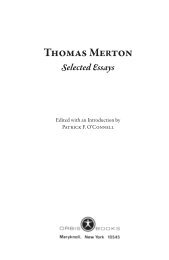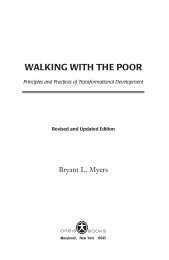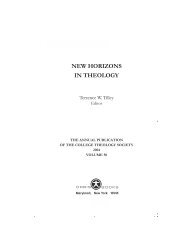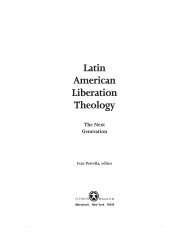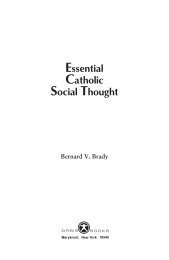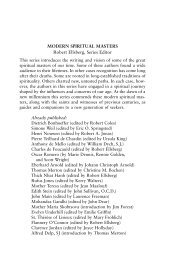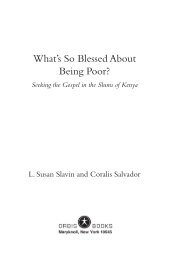CONCEPTS OF MISSION - Orbis Books
CONCEPTS OF MISSION - Orbis Books
CONCEPTS OF MISSION - Orbis Books
Create successful ePaper yourself
Turn your PDF publications into a flip-book with our unique Google optimized e-Paper software.
Mission in Contemporary Missiology 37<br />
redeemer of humanity; and the Holy Spirit works in every human heart from<br />
the first moment of creation. These truths can make Christians aware of the<br />
spiritual riches of all humankind and at the same time make others see in<br />
Christianity the fulfillment of their own highest aspirations. These truths<br />
must be put in the forefront of our theology and our catechesis (see Warren<br />
1983, 60ff.).<br />
The next moment of the theology of missionary proclamation as political<br />
reading was at the Medellín conference in 1968, where the liberation of the<br />
oppressed under social and political structures was subsumed into a vision<br />
of a praxis of integral evangelization. The Medellín documents remark that<br />
Latin America is racked by acute and rapid changes in the economic, demographic,<br />
social, and cultural spheres. As a consequence, those responsible for<br />
catechesis face a series of tasks that are complicated and difficult to combine.<br />
They must<br />
• promote the evolution of traditional forms of faith characteristic of a<br />
great part of the Christian people and bring about new forms;<br />
• evangelize and catechize masses of simple people, frequently illiterate,<br />
and at the same time meet the needs of students and intellectuals who<br />
are the most alive and dynamic sectors of society;<br />
• purify traditional forms of influence and at the same time discover a<br />
new way of influencing contemporary forms of expression and communication<br />
in a society that becomes increasingly secularized;<br />
• put to use all the resources of the church in accomplishing these tasks<br />
and at the same time renounce forms of power and prestige that are<br />
not evangelical (see Warren 1983, 66ff.).<br />
Mission and conversion. Contemporary missiology witnessed and still<br />
witnesses a heated debate on the concept of “conversion” in relation to missionary<br />
activity. Some missiologists adhered to the theory of “nonconversion,”<br />
which is said to have been a maxim of Gandhi. This theory received<br />
its theological orientation in the missionary thought of authors such as Bede<br />
Griffiths, Kaj Baago, etc. (see Missiology 6 [1978], 149). These authors think<br />
that the word “conversion” means “breaking off” people from their culture<br />
in order for them to embrace a new religion. J. López-Gay contests this way<br />
of interpreting conversion (1988, 28). The fact is that conversion forms part<br />
of the mission of Christ and of his proclamation (Mark 4:17; Luke 5:32). It<br />
also formed part of the mission of the precursor, John the Baptist (Matt 3:6,<br />
8ff.), and of the apostles (Acts 2:38). In the missionary mandate, we found<br />
the proclamation of conversion (Luke 24:47). In fact, the term “conversion”<br />
is joined to missionary work among the nations (Acts 11:18; 14:22; 17:30;<br />
26:18).



